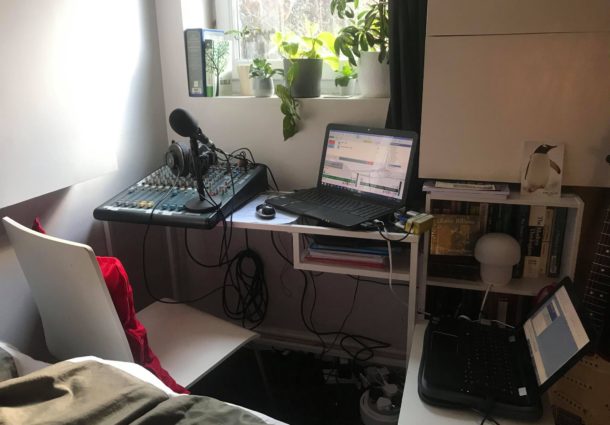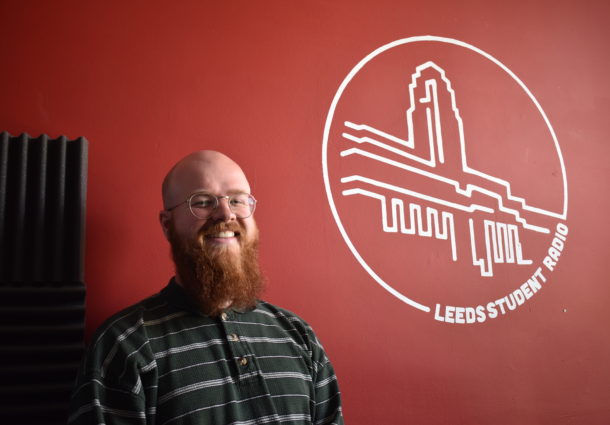“With the new academic year approaching we worked with LUU to modify our studios and offices to adhere to Covid guidelines and make our spaces safe for our students. Freshers week came, and with it the first taste of in-person broadcasting since mid-March. Despite recruitment being done virtually, uptake was strong, and with a combination of training guides and online workshops, all LSR training was done virtually too.
Broadcasting began with enthusiasm in mid-October: new members were discovering the joys of radio for the first time, and old members were thankful that LSR could go ahead as close to normal as we could hope for – albeit with a few extra plastic screens and a couple of missing sofas.
Despite hopes that the semester would see a continuing return to normal, by the end of October the picture in Leeds was beginning to look bleaker. After two and a half weeks of in-person broadcasting, we got the news that we were dreading; with the UK entering its second lockdown, we had to leave our studios behind and retreat back to our houses. It would have been all too easy to call it quits at this point, and resort to purely podcast and pre-recorded shows, but we wanted to give our members something as close to the true student radio experience as possible, and we began working out how.
Over a weekend, I worked to rebuild LSR from my dining table (much to the chagrin of my housemates), with the aim of keeping all our core shows, with the exception of core music, live. The other shows were to be pre-recorded and sent in for broadcast. I ran a workshop on how to record a radio show from home and, with that, we resumed broadcasting, four days after leaving the studios.
In our first week, we sent out over 50 hours of radio across our airwaves, of which 25 were live. For the next five weeks, our members continued to make great radio from their homes, and we finished the first semester with a virtual festival called Fed Up Fest, raising over £300 for two local foodbanks.

We had hoped that after Christmas we would be back in our studios, but lockdown was reintroduced. Although disappointed, we were prepared after the work of semester one, and launched into our next recruitment drive with spirit. Unlike in September, starting semester two we knew that it would be online, which meant we ran our recruitment mission with everyone clear on the virtual nature of broadcasting. We were amazed by the response.
We began broadcasting once again with a completely full schedule, something no other student radio in the country could boast of. Over 60 shows went out every week, all of which were produced from my (now bedroom-based) home studio. By the end of semester two, we had broadcast over 500 shows, including 223 hours of live radio, all thanks to the dedication of the committee and members.
Once we realised remote radio was going to be around for a while, our goal was to give our members something as close to the normal student radio experience as possible. We wanted to do our best to make sure that those leaving Leeds didn’t miss out on their finale, and that new members got to experience the camaraderie and excitement of doing those first shows. Of course, the extra effort required just to keep LSR on-air whilst remote did have an impact on the non-regular content we could put out, but we still wanted to make sure we continued pushing forward and working with other societies and student bodies.
During Black History Month we filmed a series of panel discussion videos with The Gryphon and Leeds Student Television, and we made using our platform for LGBT+ History Month and International Women’s Day one of our main aims. We ringfenced several slots a week for special one-offs, which took the form of panel shows, specialist music shows, and later responses to the murder of Sarah Everard and the resulting protests around the country.
In addition to The Gryphon’s weekly show, Gryph-On Air, LSTV joined us with a weekly podcast. The School of English also held a fortnightly show with students discussing the crossing of art, politics and culture with literature. The Union Music Library also entered the LSR family with its weekly specialist music show, and we were able to give Open Theatre a platform to host their radio plays, which were broadcast to hundreds of listeners.
Although regular broadcasting is now over another year, we still have a few big things in the pipeline. A fundraiser for Student Minds, a special SRA Chart Show and our annual Transmission festival in June are all on the cards (and maybe even a radio marathon to see off the year properly…?)”




